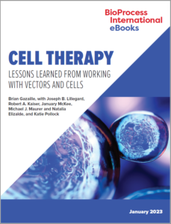Voices of Biotech
Podcast: MilliporeSigma says education vital to creating unbreakable chain for sustainability
MilliporeSigma discusses the importance of people, education, and the benefits of embracing discomfort to bolster sustainability efforts.

Gene-modified cell therapies hold much promise for cancer treatment. Currently, the most popular approach leverages T cells expressing chimeric antigen receptors (CARs), which give immune cells the specificity needed to bind with and destroy malignancies. Despite rapid progress in drug discovery and development, the biopharmaceutical industry still has much to learn about manufacturing CAR T-cell therapies in commercially feasible ways. In this eBook, BPI’s managing editor speaks with subject-matter experts from VIVEbiotech, Castle Creek Biosciences, and Bristol Myers Squibb (BMS) to identify obstacles that cell-therapy companies are likely to face on the path to CAR-T commercialization. These experts call attention to two areas of particular need, representing how T cells are engineered into therapeutic agents and how their properties are maintained until administration: viral-vector production and cryopreservation of finished therapies. This eBook explores key considerations for those processes, highlighting continuing knowledge gaps and technological needs.
The first eBook chapter focuses on considerations for manufacturing lentivirus (LV), which remains the industry’s vector of choice for ex vivo gene delivery. Discussions with scientists from VIVEbiotech and Castle Creek Biosciences reveal that although upstream production processes seem to be well established for LV, large construct sizes can limit viral titers, diminishing process economics. Vector manufacturers also need to account for the relative fragility and instability of such vectors to optimize purification processes and increase recoveries. In a second chapter, BPI’s managing editor speaks with Katie Pollock (associate director and head of formulation and cryobiology at BMS) to learn what T cells experience during cryopreservation. Pollock underscores the complexity of that process and identifies factors that can diminish the quality and efficacy of cellular products.
Fill out the form below to read the full eBook now.
You May Also Like